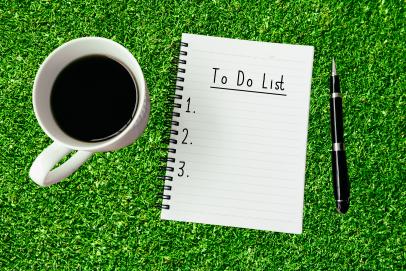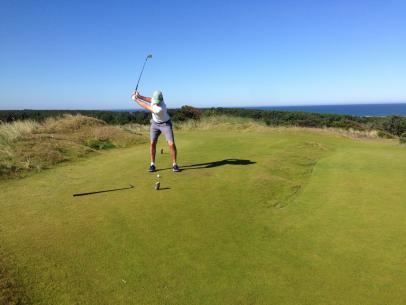Most of the golfers I play with are better than me. There is a joke in there somewhere about what that says, but I prefer to point to the company I keep. My oldest son now plays in college. My coworkers are mostly former college golf snobs as well. Even in my weekend game I’m more likely to be getting strokes than giving them.
The challenge of playing with superior golfers is your weaknesses tend to stare you in the face. Everyone hits it longer. Most are sharper around the greens. This is not an experience you sign up for in the interest of pumping your ego.
What playing with good golfers does offer is an opportunity to get better, but it’s not through osmosis, and you need to know what to look for. Between conversations with smarter golfers and my own trial and error, I’ve arrived at a few conclusions about how to enjoy, perform and improve as the worst player in your group.
1. Accept help when you can get it
This is a thing that happens. I am on the first tee with a group of players who announce their low single-digit or scratch handicap and I grow self-conscious about being a meager 11. There are so many reasons this is dumb, but two are: A) I need all the help I can get; and B) They’re going to find out if I’m good or not regardless. The first thing you can do to ensure a decent game is to set yourself up for success. That means taking the appropriate number of strokes when competing—not more, sandbaggers—and yes, maybe even playing from different tees. That last part is a tough pill for some to swallow, but on certain courses, it beats the alternative. Last week I stupidly agreed to play from the tips on a long, soft golf course with a couple of golfers who crushed the ball past me. The distance gap was significant enough that the strain creeped into the rest of my game. Before making a single swing, I made my biggest mistake of the day.
2. Stop worrying what people think
I am usually self-absorbed enough to assume everything’s about me, but at least in this context, I’ve been happy to learn otherwise. Much as you might think good players are standing in harsh judgment over each of your bad shots, it turns out other golfers are self-absorbed as well. They don’t really care that you played much better last week, or that this is a new 5-wood in the bag you’re still getting used to. From you, they mostly want three things: that you’re not slow; that you’re decent enough company; and that if you are hitting drives into obscure corners of the course you’re keeping an eye on the ball as well. No one really cares if you stink provided you are not dragging them down in the process.
More Low Net  Low Net There is a proven scientific way to follow through on your golf goal
Low Net There is a proven scientific way to follow through on your golf goal  Low Net A history of swing thoughts
Low Net A history of swing thoughts  Low Net The surprising reason you should be playing more from forward tees 3. Soak up what you can
Low Net The surprising reason you should be playing more from forward tees 3. Soak up what you can
One of my favorite old golf commercials is that Nike spot featuring Tiger Woods on the range hitting balls alongside a group of weekend golfers when they are briefly lulled into Woods’ spell and start striping the ball in sync.
The halo effect of a good golf swing is real, and some of it is mere proximity. Good golfers are better for a reason. They are more efficient, often less harried. Play with them enough and you often become a more efficient, less harried version of yourself. Don’t just take my word for it. Sports psychologists have detailed how mere visualization triggers the motor neurons in the brain, which basically means just seeing someone doing something better than you helps you do it better yourself. Spend time around a good golfer’s tempo, for instance, and you’re more likely to adapt their tempo as your own.
These learnings expand well beyond mechanics. Good golfers are also good because of, quite simply, the absence of stupidity. They don’t try as many hero shots that compound mistakes. They take big numbers out of play by assessing risk reasonably. It’s not just that they make fewer bad swings than you. It’s more that their bad swings don’t cost them nearly as much.
4. Don’t assume it’s all about talent
Some benefits are subconscious, while others require your attention. That round from the tips last week was difficult, but I thought I should chalk it up to ability. Some guys can just swing faster.
Fair reason? Or was it more of a copout?
When discussing some of my distance challenges with Matt McCullough, the Director of Instruction at the Country Club of Darien, he suggested a reason I hadn’t considered: effort.
“There’s definitely a lot of data that supports this, that technically the faster you swing, or the more effort that you put into your swing, the more sequentially correct you become,” McCullough said. “So your golf swing actually gets better.”
It was a small example, but one that stuck. When comparing yourself to better players, don’t assume the differences are all outside your control.
5. But also realize you’re not them
Much as we all stand to learn from better golfers, the gap can’t be bridged overnight. Trust me … pausing for dramatic effect … I know. Just as you shouldn’t be shy about accepting strokes or moving up a tee box, you also need to delineate between the things you can emulate and the things that aren’t yet in your toolbox. When playing with better golfers, I have to remind myself not to take the same aggressive lines off tees, or to expect my chips to spin and stop so abruptly. Every round like this features a wake-up call or two, but what helps is a mindset that is half realist, half optimist. I’m not there now, it says, but I can still get there one day.
“You know, Tuesday through Friday, you can put in work. To increase your speed, better your technique, and give yourself a better game plan. But when you walk onto the golf course that day, this is what you are,” McCullough told me. “So play to your advantages, have a solid course strategy, and you’ll have a good a chance if the handicaps are correct.”
This article was originally published on golfdigest.com



